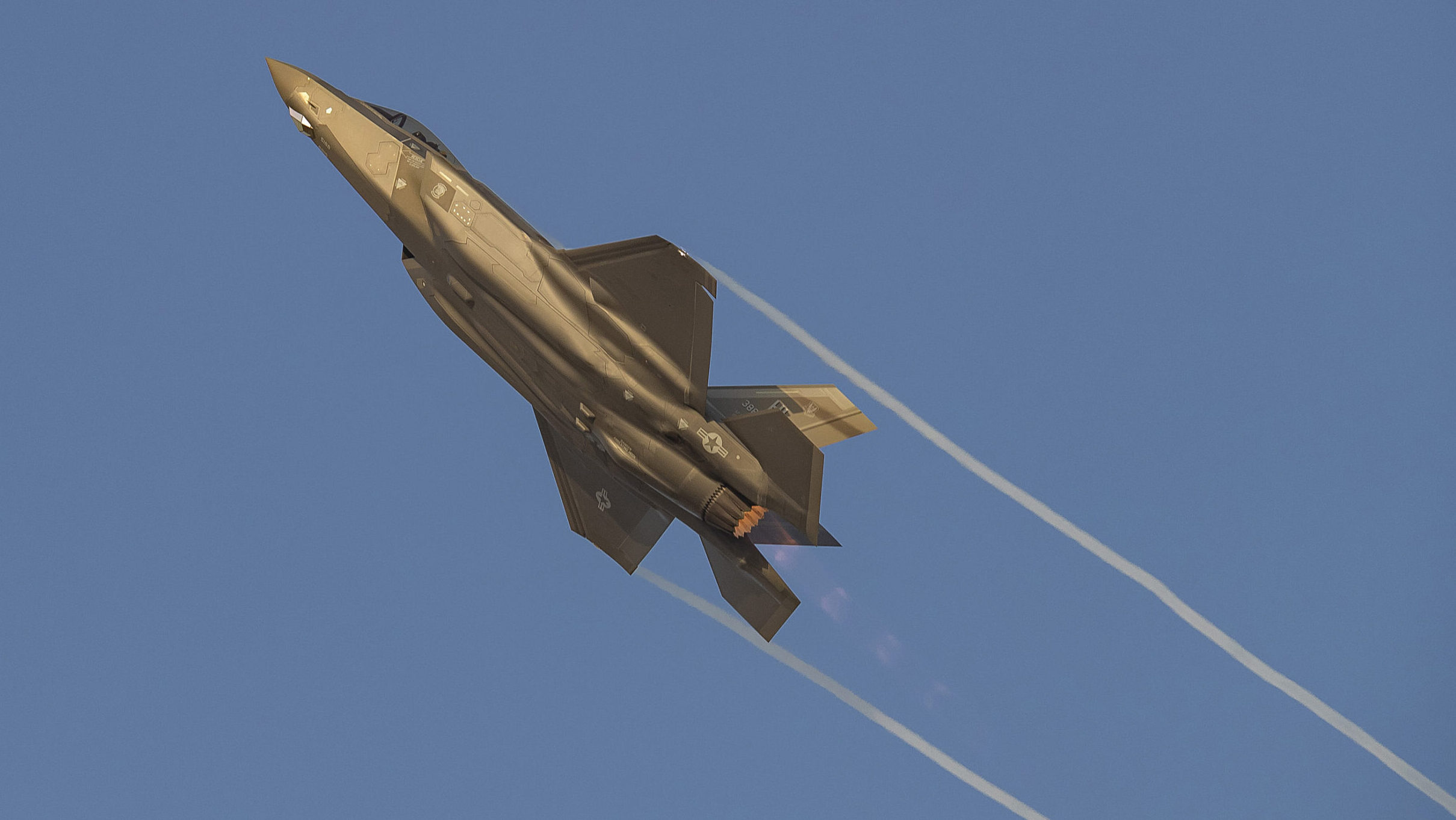
An F-35 flying at the Dubai air show 2019 (Lockheed Martin)
DUBAI: It is no secret that the F-35 fighter deal to the UAE is politically sensitive, tied up with questions about the UAE’s military actions in Yemen and maintaining Israel’s Qualitative Military Edge in the region. But the impact of Russia and China, America’s great power competitors, on the question of the sale is a growing factor that can’t be ignored.
For several months, rumors have abounded that the Biden administration is holding up movement on the F-35 sale — cleared in the literal last hours of the Trump administration — unless the Emiratis agreed to terminate a 5G contract with Chinese technology firm Huawei. On the record, officials from both the UAE and the US have avoided confirming that situation.
However, ahead of the Dubai Airshow, when all three major powers are expected to show of their wares to the Middle Eastern market, a reliable UAE military source tells Breaking Defense that Emirati leadership understands the severing of ties with Huawei to be a red line on moving the F-35 deal forward.
“It is very unlikely the UAE will do so,” he said. “The [UAE] leadership is now ignoring the Biden admin and letting the defense companies and its lobby do their work on the Hill.”
Asked directly by Breaking Defense whether the US was conditioning the F-35 sale on Huawei, Mira Resnick, the US deputy assistant secretary of state for regional security, said that the United States has made clear to the UAE and other partners that “untrusted vendors represent a threat to their own security [and] to US security.
“We are working with with partners around the world to look at other options there to make sure that their security can be maintained,” she said during the Nov. 12 exclusive interview.
While noting the US is “fully committed” to moving forward to the sale, Resnick added that “I think that there are a number of obligations when it comes to technology security, that the UAE must be able to provide assurances on and and we are looking for clarification of those assurances.”
Her comments underscore that Huawei’s presence as the primary 5G provider for the UAE would enable the Chinese to possible steal American technology, including from the highly-networked F-35.
“The Biden administration went as far as requesting Abu Dhabi to choose between the Chinese technology and the F-35,” said Fadi Assaf, co-founder of Beirut-based consultancy Middle East Strategic Perspectives (MESP). “This issue seems nonnegotiable,” he added. “How would Abu Dhabi deal with it? Will it look for alternatives or offer guaranties?”
If the US is holding firm on a no-Huawei line for the F-35, “The UAE will have to follow suit of UK in giving up the Huawei 5G contract with China in favor of joining the F-35 club for national security purposes,” said Kuwaiti defense expert Ali Al Hashim.
The UK’s mobile providers are being banned from buying new Huawei 5G equipment after Dec. 31, and they must also remove all the Chinese firm’s 5G kit from their networks by 2027.
From its end, the UAE has attempted to quiet concerns regarding the overall F-35 deal. In a clear message a year ago, Ambassador to Washington Youssef Al Otaiba said in a tweet: “There has never been a report of US technology being diverted to an adversary by the UAE. For more than 20 years, the US has entrusted the UAE to purchase and operate F-16s, Patriots, THAAD and many other of the most advanced US-supplied defense systems.”
Getting the F-35 isn’t just a matter of upgrading the UAE’s military. There is also a major prestige factor at stake; the UAE has long thought of themselves as the likely first Arab recipient of the jet, and they cannot imagine being excluded from the program, said Assaf.
“They consider themselves as totally legitimate,” said Assaf. “The UAE is the US’s closest Arab ally and is now deepening its partnership with Israel, sharing with both countries most of their strategic concerns and geopolitical priorities. Enhancing interoperability with their allies is, too, a high priority for their Armed Forces.”
Hence, the UAE is motivated to make the deal happen — and there are plenty of supporters in Washington, thanks to the industrial impact and a desire to keep the Emiratis closely tied to US strategic interests.
As a result, said Bilal Saab, a former Pentagon official now director of the defense and security program at the Middle East Institute, “When the political dust settles in Washington, I expect Emirati fighter pilots to be operating a variant of the F-35 some time in the next few years.”
Prime contractor Lockheed Martin, unsurprisingly, remains fully committed to the program, showcasing a full-scale model of the F-35 jet at the Dubai air show taking place here. “We see strong global interest in the F-35 and look for opportunities at trade shows to showcase why the F-35 is the most advanced, capable and affordable aircraft available, as the only 5th generation fighter,” a Lockheed Martin spokesperson told Breaking Defense.
Asked about the Huawei situation, the spokesperson responded “Questions about foreign military sales of the F-35 are best addressed by the US government, and questions about the UAE’s interest in F-35 are best addressed by the UAE government.”
Russia seeks to put UAE in Checkmate
While the US and China politically duke it out behind the scenes, Russia is not-so-subtly pitching a potential replacement should the F-35 deal fall apart.
Russia’s Su-75 Checkmate fifth-generation single-engine fighter will be be making its international debut, following its unveiling at the MAKS-2021 air show in July.
“Russia is mainly trying to win more support from the Emiratis for this program,” said the UAE military source. “The Emiratis on the other hand could benefit from this to send a very strong signal to Washington that they have other options in case they want to undo the F-35 deal.”
RELATED: Russia’s New SU-75 Checkmate Promises A Lot. Can It Deliver?
So as a plan B, the UAE could go for either a Russian alternative or a sort of a second best fighter jet, probably the French Rafale. At least, that’s on paper. Analysts are less convinced that’s a real option for the UAE.
“That will only happen if they sense that there will be more delays in the [F-35] program or that strict conditions are imposed to the use of the F-35s or if there is a risk of further downgrading their systems,” said Assaf.
The UAE will consider procuring fighter jets from other countries “if and only if the deal with the US falls apart,” predicted Saab. “Abu Dhabi fully understands how sensitive this topic is for US decision makers.”
Added Samuel Archer, a senior military analyst with Aviation Week, “While UAE flirting with the checkmate could even be likely, actual procurement of the system is fairly unrealistic.” He called the UAE buying the Su-75 “unrealistic.”
Analysts also question where Russia’s new fighter will perform as advertised by the scheduled production timeframe.
“Sukhoi and the Russians are depending on new technology to set the Su-75 apart from western 5th gen fighters, but new technology hasn’t been Russia’s strong suit in recent decades,” said Brandon C. Patrick, a Mid-East defense analyst. “The idea that Russia will, as they’ve put it, offer a 5th generation platform capable of consistently defeating its western counterparts seems far-fetched.”
Al Hashim sees eye to eye. “The checkmate still needs to prove itself first to even compete with the F-35,” he said. “Even if the UAE decided to invest in the new Russian technology, it would have to wait for at least seven to ten years to have it ready, assuming the Russians would cooperate in all development aspects.”
Back at IDEX 2017, Rostec and the UAE announced they will be co-developing a fifth generation joint light fighter aircraft. Clearly, that hasn’t materialized, which may provide a clear view on how the UAE views its partnership with Russia.
“The attempt to co-develop a fifth-gen fighter with the UAE is very like the attempt to co-develop with India in the FGFA project that also seemingly evaporated,” said Archer. “The program announced in 2017 is as dead as the FGFA, but Russia is almost certainly still pursuing both opportunities.”
The Checkmate seems to embody this. “It really was not made to fill a domestic requirement, but secure a major export customer and hopefully also a developmental partner, to justify continued development of the Su-57 and other next-gen fighter technology,” concluded Archer.
Valerie Insinna in Dubai contributed to this report.






















